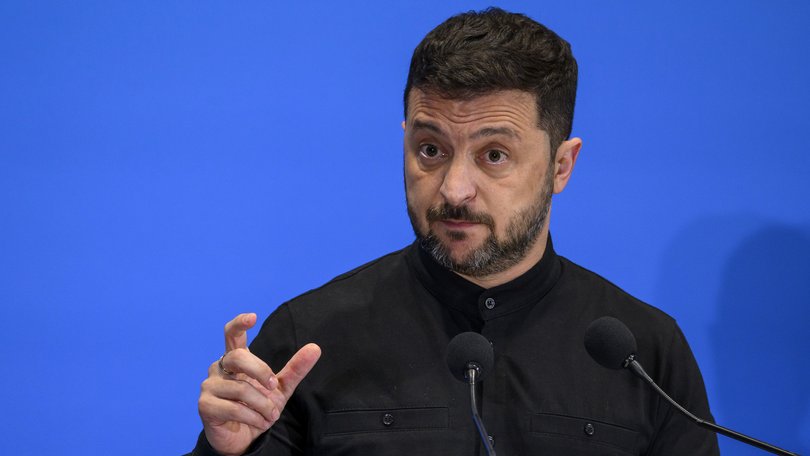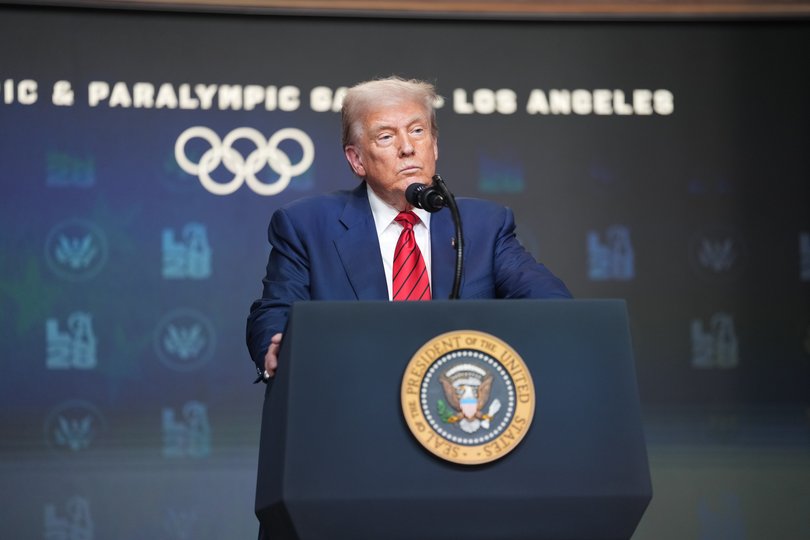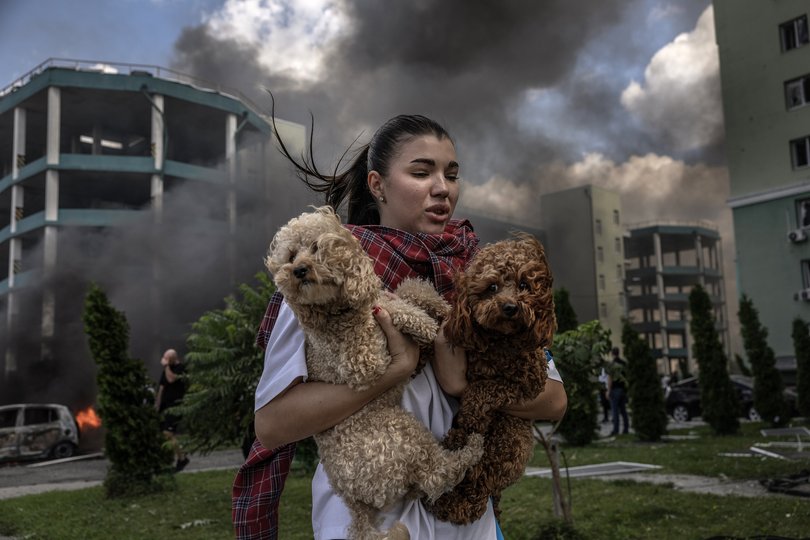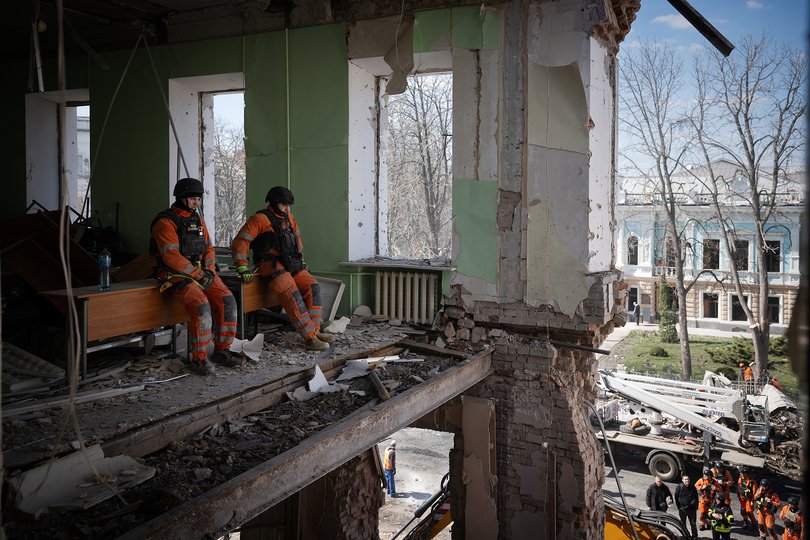THE NEW YORK TIMES: Zelensky rejects ceding territory to Russia after Trump suggests a land swap
THE NEW YORK TIMES: ‘Ukrainians will not gift their land to the occupier’.

President Volodymyr Zelensky of Ukraine on Saturday flatly rejected the idea that Ukraine could cede land to Russia after President Donald Trump suggested that a peace deal between Ukraine and Russia could include “some swapping of territories.”
“Ukrainians will not gift their land to the occupier,” Zelensky said in a video address from his office in Kyiv, several hours after Trump’s remarks, which appeared to overlook Ukraine’s role in the negotiations.
“Any decisions made against us, any decisions made without Ukraine, are at the same time decisions against peace,” Zelensky said. “They will bring nothing. These are dead decisions; they will never work.”
Sign up to The Nightly's newsletters.
Get the first look at the digital newspaper, curated daily stories and breaking headlines delivered to your inbox.
By continuing you agree to our Terms and Privacy Policy.His blunt rejection risks angering Trump, who has made a peace deal between Ukraine and Russia one of his signature foreign policy goals, even if it means accepting terms that are unfavorable to Kyiv. In the past, Trump has criticised Ukraine for clinging to what he suggested were stubborn ceasefire demands and for being “not ready for peace.”
Trump said Friday that he would meet with President Vladimir Putin of Russia on August 15 in Alaska to discuss a possible peace deal, with potential land swaps most likely on the agenda.
“We’re going to get some back, and we’re going to get some switched,” he said during an event at the White House. “There’ll be some swapping of territories to the betterment of both.”

Trump did not clarify which territories could be swapped, and Ukrainian officials appeared uncertain about what he meant. Because Ukraine holds no Russian land, a swap would mean ceding Ukrainian-controlled territory in return for land currently occupied by Russia.
But that approach clashes with a widely held view in Ukraine against surrendering territory to end the war, which left Zelenskyy little choice but to reject any land concessions. To do otherwise would probably have exposed him to fierce criticism and become a political bombshell at home.
A recent poll by the Kyiv International Institute of Sociology found that more than three-quarters of Ukrainians are against transferring Ukrainian-controlled territory to Russia. When it comes to ceding land that includes territory already under Russian control, opposition drops slightly, with a little more than half of Ukrainians against it, “even if this makes the war last longer and threatens the preservation of independence,” the poll says.
But support for land concessions has grown since Ukraine’s failed 2023 counteroffensive, which underscored its inability to retake substantial territory. About 38 per cent of the population thinks ceding land is acceptable now, according to the poll, up from only 10 per cent about two years ago.
Russia has long demanded that Ukraine give up four regions in the east and south that Moscow claims to have annexed in late 2022, even though some of that territory remains under Ukrainian control. The Kremlin is particularly intent on seizing full control of the eastern regions of Luhansk and Donetsk, which it has long sought to capture with relentless assaults.
But ceding Luhansk and Donetsk, which are part of an area commonly known as the Donbas region, would create a host of issues for Ukraine. It would mean giving up a region rich in cities and industrial centres that Russia could use as a launchpad to reignite the war.
And Ukraine would have to abandon its main fortified defensive line in northern Donetsk, stretching between the cities of Sloviansk and Kostiantynivka, which has so far withstood Russian assaults.
“Exchanging territories is not peace, it is a breather for the enemy before a new attack,” an officer from Ukraine’s 72nd Brigade said Saturday in a text message. Speaking from the eastern front, he asked to be identified by only his call sign, Barbarossa, for security reasons and in keeping with military rules.
“We do not bargain with the blood and graves of our people,” he added. “Every meter of Ukraine has been fought for, and my brothers in arms paid for it with their lives.”

Kyiv would also face the challenge of evacuating about 200,000 civilians still living in Ukrainian-controlled territory in the Donbas region, while those who stayed behind would risk abuse by Russian occupying forces.
Trump’s suggestion of bargaining away some territory to secure peace — an idea that has been floated for some time by his administration but never embraced so openly — has struck a raw nerve among some Ukrainians.
Petro O. Poroshenko, Zelensky’s predecessor, wrote on Facebook that “Ukrainians are a nation that does not trade its own territories.”
“Therefore,” he said, “we cannot set a precedent where peace is achieved at the expense of concessions on the part of Ukraine.”
It also remains unclear what territory Ukraine might get in a potential swap. In addition to territories of the Donbas region, Russia holds large parts of two southern regions, Zaporizhzhia and Kherson, as well as tiny areas it captured in the northeast, near the cities of Sumy and Kharkiv.
The only time Zelensky suggested a land swap was when Ukraine held some of Russia’s western Kursk region, from last August to this past March. He then proposed to trade Kyiv’s foothold in Kursk for Russian-held territory. “We will swap one territory for another,” he told The Guardian in February.
But Moscow’s forces retook Kursk in the spring, erasing Kyiv’s bargaining chip.
In rejecting Trump’s proposal, Zelensky invoked Ukraine’s Constitution, which states that the Ukrainian territory is indivisible and inviolable. “The answer to Ukraine’s territorial question is already in the Constitution of Ukraine,” Zelensky said. “No one will step back from this, nor will anyone be able to.”
Zelensky said that Ukraine was “ready, together with President Trump and with all our partners, to work for a real and, most importantly, lasting peace — a peace that will not fall apart because of Moscow’s desires.”
Whether Kyiv will have any room to manoeuvre now that it has dismissed Trump’s proposal remains to be seen.

Mykola Davydiuk, a Ukrainian political analyst, said Zelenskyy and his team were now seeking ways to avoid being sidelined in the negotiations, such as by rallying their European allies and pushing to set the terms and structure of peace talks.
But Kyiv’s approach to how a peace deal would be structured clashes with Moscow’s conception. Ukraine insists on securing a ceasefire before discussing any peace terms, including territorial issues. The Kremlin, by contrast, demands that talks begin without first agreeing to a ceasefire and that they address the “root causes” of the war. That is Kremlin shorthand for a range of issues, including the existence of Ukraine as a fully independent and sovereign nation aligned with the West.
With Trump agreeing to peace talks in Alaska next Friday, it is Moscow’s approach that, for now, appears to be prevailing.
“This is about appeasement and about acknowledging that the aggressor is right — that whatever he wants, he will have,” Kateryna Zarembo, a Ukrainian policy analyst who now serves as a medical volunteer on the front, said in an interview. “With this, the war cannot be ended.”
This article originally appeared in The New York Times.
© 2025 The New York Times Company
Originally published on The New York Times
